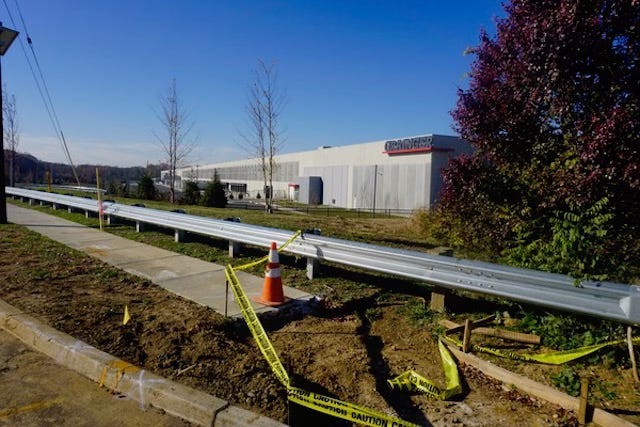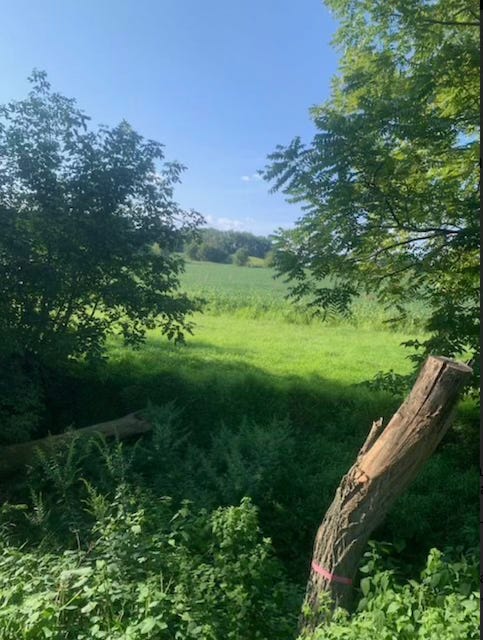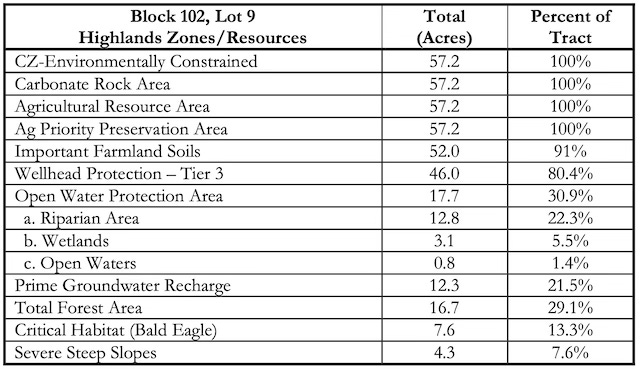Pending Warehouse “Redevelopment” Approval Makes A Mockery Of The Highlands Act And The Highlands Council’s New “Warehouse Policy”
The Council Is Bending The Rules To PROMOTE Warehouse Development On Farmland
The Highlands Council staff – with no objections by the Murphy administration’s DEP – is claiming that paving over and constructing a 400,000 square foot warehouse on 40 (of 52) acres of environmentally sensitive forests and farmland (development of 80% of total land) would “maintain and enhance water quality”.
And that’s a quote. But I’m getting way ahead of myself.
On July 29, the NJ Highlands Council staff recommended approval of a major warehouse development application under the guise of a “Redevelopment Area” designation of farmland and forested land in rural Lopatcong and Pohatcong Townships (read the full staff Report). It would approve construction of over 1.2 million square feet of new warehouse development.
The Council’s designation would also trigger the DEP water quality management planning rules for extending sewers to serve new development, which is something that is prohibited in the preservation area and highly discouraged in the planning area” under the Highlands Act and Regional Master Plan (RMP):
The RMP does not support extension of water/sewer service in the Conservation Zone or any of the environmentally constrained sub-zones (rear property). The service extension would only be permissible for the proposed warehouse with the approval of the Highlands Redevelopment Area.
Get that? Repeat:
The RMP does not support extension of water/sewer service in the Conservation Zone or any of the environmentally constrained sub-zones … sewer service extension would only be permissible for the proposed warehouse with the approval of the Highlands Redevelopment Area.
The public comment period was scheduled to expire on August 9 but was extended to August 30. In an unusual move that appears to be an attempt to frustrate public opposition, the Highlands Council cancelled its scheduled August 15 meeting.
This approval is the first test of the Council’s highly touted new “Warehouse Policy”, which was purported to more strictly regulate and discourage inappropriate warehouse development in the Highlands. The Council pronounced:
As the source of drinking water for more than 70% of the State’s residents, the Highlands Region requires special protections. For this reason, the Highlands Council developed Highlands specific policy standards for siting of warehouses in the Highlands Region
The Council’s pending approval of this warehouse “redevelopment” application vindicates my prior criticism of the warehouse policy as toothless and doomed to fail, see:

This could be one of the worst abuses to promote inappropriate development I’ve ever seen in my 35 year career. Let me highlight just the worst abuses, which illustrate that:
- the Highlands Council is not merely ineptly failing to enforce the law and protect the Highlands forests, farms and water quality. They are actually promoting warehouse development on environmentally sensitive farmland and coaching the developers on how to exploit loopholes; (note the use of the passive voice: “it was recommended”):
The Township originally submitted a Highlands Center designation proposal including these properties. After a review of the proposal by the Plan Conformance Committee on October 5, 2023, it was recommended that the Townships amend the center petition to remove these properties and instead submit a Highlands Redevelopment Area application. This recommendation was based on the proposed redevelopment of the Phillipsburg Mall property and the lack of comprehensive center-based planning that the finding for a consistent Highlands Center would require.
The Council itself cooked up this scheme because the prior plan was not approvable. The Highlands Council – not some lawyer for developers – recommended abuse of the NJ Redevelopment law, which allows developers to skirt Master Plan and Zoning ordinances and has been abused across the State for many years to promote inappropriate developments.
How can undeveloped forests and farmland be “in need of redevelopment”?
- the Highlands Council manufactured an absurd scheme to include an exempt nearby existing Mall development in order to allow the farmland to meet “impervious surface” requirements to allow the redevelopment designation;
The Phillipsburg Mall redevelopment project is exempt from the Highlands Act and has received all local approvals. It is included in the application to reach the necessary impervious surface calculations to qualify the rear area as a Highlands Redevelopment Area.
Did you get that? The Council is allowing developers to use a Mall, which is exempt from the Highlands Act and technically not part of the “redevelopment”, to meet impervious surface (roofs, parking lots) standards on a farm!
- the Highlands Council approved a “restoration plan” that would allow destruction of 40 of 52 acres of “priority preservation” designated farmlands, with this sham claim:
Such a restoration initiative would be protective of the riparian, wetland, and open water resources on the site and would contribute to maintaining and enhancing water quality.
Did you get THAT? The Council is claiming that destruction and warehouse development of 40 acres of a 52 acre farmland and forested parcel (80% of the land) will not only “maintain” but “enhance water quality”!
This contradicts well established science – which is the basis for several DEP regulations – that shows that just 10% impervious surface leads to impairment of water quality. It also contradicts common sense: how can all that polluted runoff from a warehouse roof and heavily truck used roads and parking lot “enhance” water quality?
Does this farmland look like “an area in need of redevelopment”? The land is surrounded by forested lands in the NJ Highlands, which are supposed to be protected from development under the NJ Highlands Act:

Block 102 Lot 9 in Lopatcong (57.2 acres). The property is currently farmland with a wooded area providing a buffer along the Lopatcong Creek to the western edge. The project as proposed would consist of a 367,350 square foot warehouse with a total impervious surface of 15.38 acres. Vehicular access would be provided via internal driveways through the former mall site to US Route 22.
Here are the sensitive environmental features for 52 acres that will be converted to a warehouse: (see Highland Council staff Report recommending approval):

Take a close look at the environmentally sensitive features on this site.
- 100% – all of it – of the site is “environmentally constrained” and a “priority agricultural preservation area”.
- Over 80% of the site is a “well head protection” area. Get that? A warehouse on top of your drinking water recharge!
- Almost 30% of the site is forested.
- There is even 13.3% bald eagle critical habitat.
On top of all this, the Highlands Council is reversing prior plans and allowing an expansion of a previously approved “Center”, which did NOT include these environmentally sensitive farmlands:
Lopatcong and Pohatcong Townships are conforming Highlands municipalities located at the southernmost end of Warren County. Each sought and received Highlands Council petition approval for Preservation and Planning Area lands, along with Highlands Center designations in the 2011-2012 timeframe. The area subject to this Highlands Redevelopment Area application was not included within the previously approved Highlands Centers.
Warehouse development of 52 acres of environmentally sensitive farmland is not the entire plan the Council staff recommended approval of. It includes almost a million square feet of warehouse development on 75 acres of nearby parcels:
Block 102, Lots 9.01 and 9.03 in Lopatcong (30.58 acres) and Block 1, Lot 1.01 in Pohatcong (44.08 acres): The mostly vacant 577,000 sq. ft. Phillipsburg Mall is being redeveloped into an 833,000 square foot warehouse.
The Phillipsburg Mall redevelopment project is exempt from the Highlands Act and has received all local approvals. It is included in the application to reach the necessary impervious surface calculations to qualify the rear area as a Highlands Redevelopment Area.
The staff Report relies on an absurd form of “regional planning” (i.e. including nearby paved Mall property to allow a farm to comply with “impervious surface calculations to qualify the rear area as a Highlands Redevelopment Area”).
But it fails to consider cumulative regional impacts of truck traffic!
The staff Report relies on an old traffic study, and reaches these incredible conclusions (are they aware of the fact that a 18 wheeler truck trip to a warehouse is VERY different from a passenger car going to a mall?:
The results suggest that under the proposed build-out, trip generation would be similar to existing conditions for the weekday morning peak hour, but significantly reduced from existing conditions for weekday afternoon and Saturday midday peak hours.
The staff admit that they lack a credible traffic analysis and that their approval puts the cart before the horse:
The one-mile travel distance on Route 22 between the subject site and the I-78 interchange is in keeping with the Highlands Council Warehouse Guidelines. Assuming ample highway capacities to absorb the increase in flows, such proximate and direct access should ensure that heavy truck traffic needn’t use local roads and byways to get to or from the facility.
A much more comprehensive regional study is needed to understand the impacts of full build-out of these and all the other projects already in the ‘pipeline’ for Route 22 and I-78 on the highways’ through-lane levels of service. Highlands Council staff have discussed this issue with NJTPA and will look to work with NJPTA and Warren County moving forward.
The Council’s pending approval exposes their new Warehouse Policy as sham.
Water to supply the project would be sucked out of the Delaware River from groundwater wells (“induced recharge”), and the Council staff have no problem with this abuse and damaging precedent either:
The Highlands Council has determined that the wells Aqua uses draw essentially all of their supply from the Delaware River through induced recharge. Thus, they do not represent a consumptive or depletive water use relative to the source sub watershed.
The site is underlain by Karst geology (prone to erosion and sinkholes) which makes the required on site recharge of stormwater impossible. That alone could be a basis for denial. Yet once again, the Council issues this absurd and dangerous precedential finding:
Due to the presence of Karst Topography, no recharge on site is proposed. The development should provide for 100% of the average annual pre-construction groundwater recharge volume elsewhere in the same subwatershed.
Elsewhere? Like where? Somewhere over the rainbow?
Yet despite all these major flaws – which individually should be fatal flaws and a basis to deny the application – the staff Report finds the redevelopment area consistent with the Highlands Act and RMP.
The primary basis for that consistency determination is fatally flawed by allowing the impervious surfaces of the Mall to qualify the farmland as eligible for redevelopment are designation.
The other primary basis for approval clearly elevates sham economic development arguments over protection of natural resources, community character and water quality, forest, and farmland.
Here it is – and it reads like it was written by lawyers for the developer:
d. Given that redevelopment is a significant opportunity for sustainable economic development and smart growth in the Highlands Region, this proposed redevelopment project was reviewed regarding consistency with RMP policies and objectives relevant to smart growth and sustainable economic development. The RMP calls for economic development that is “sustainable over time,” and not dependent on “development of undeveloped lands.” The Highlands Act calls for the RMP to “promote compatible…uses and opportunities within the framework of protecting the Highlands environment.”
e. Designation of the proposed Highlands Redevelopment Area provides for beneficial use of the site. By reusing and redeveloping previously disturbed areas, economic investment and community development within the framework of smart growth is assured. The project promotes smart growth policies by maintaining land use patterns, balancing economic development with resource protection, and providing an equitable distribution of the costs and benefits of redevelopment. The proposed parking lot expansion complements the existing development pattern of this area.
The Highland Act does NOT authorize or direct the Highlands Council to “balance” economic development and resource protection. It is heavily weighted toward protection. The word “balance” is used just twice in the Act, and the term refers only to a “balanced transportation system”, not balance of economic development and protection. (I know, I wrote portions of it and was part of a very small team that drafted the introduced version of the bill.)
The farmland parcel of land is not “previously disturbed area”, so that’s just a falsehood.
Oh, and of course, leaving the worst for last, there was absolutely NO CONSIDERATION of any energy demand, renewable energy potential, and climate impacts associated with this massive development project.
[End Note: Clarification: The staff Report’s recommended approval with conditions must be voted on and approved by the Highlands Council. That must be done in a public hearing. The staff report was signed off on by Executive Director Ben Spinelli and the staff recommended approval makes it much harder for the Council to vote it down and creates legal vulnerabilities if they don’t do it correctly with the proper scientific and regulatory basis. The Council has not voted on the recommended approval. My apologies for creating confusion here.]
